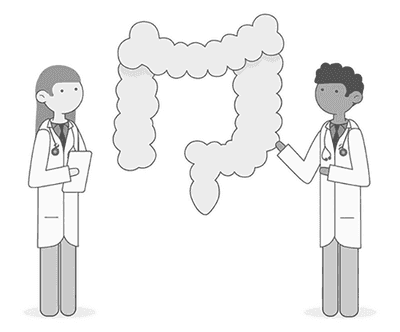Understanding Colon Health
Blog

Understanding Colon Health: The Role of Good and Bad Bacteria
Your colon plays a crucial role in digestion, nutrient absorption, and overall gut health. One key factor influencing colon health is the balance of good and bad bacteria in your gut. When this balance is disrupted, it can lead to digestive discomfort, inflammation, and even chronic health conditions. By understanding how these bacteria function, you can take proactive steps to support a healthy gut and overall well-being.
The Good Bacteria: Why Your Colon Needs Them
Good bacteria, also known as probiotics, are essential for maintaining digestive health. These beneficial microorganisms help break down food, support immune function, and keep harmful bacteria in check.
How good bacteria improve digestion and absorption
Probiotics help break down complex carbohydrates, fiber, and proteins, making it easier for your body to absorb nutrients. They also produce essential B and K vitamins for energy production and blood clotting. A healthy gut flora also promotes regular bowel movements and reduces bloating and discomfort.
The role of probiotics in colon health
Probiotics not only aid digestion but also help prevent infections and reduce inflammation in the colon. They can restore balance in the gut microbiome, especially after taking antibiotics or experiencing digestive distress. Many people take probiotic supplements, but those have not yet been fully validated or recommended at this time. Getting probiotics from natural food sources is more beneficial. Avoiding unnecessary antibiotics will help support the healthy bacteria to grow.
Best foods to promote healthy gut bacteria
To support good bacteria, incorporate probiotic-rich foods into your diet, such as:
- Yogurt (with live and active cultures)
- Kefir
- Sauerkraut
- Kimchi
- Miso
- Tempeh
- Kombucha
Prebiotic foods like bananas, onions, garlic, and whole grains are another way to feed good bacteria and help them thrive.
The Bad Bacteria: How They Harm Your Gut
While good bacteria support digestive health, bad bacteria can cause significant problems when they overgrow. An imbalance in gut bacteria, or dysbiosis, may lead to bloating, constipation, diarrhea, and even increased risk for chronic diseases.
Signs of an Unhealthy Gut Flora
If bad bacteria outnumber good bacteria, you may experience:
- Persistent bloating and gas
- Irregular bowel movements (constipation or diarrhea)
- Food intolerances
- Frequent infections or weakened immunity
- Unexplained fatigue
- Skin issues like acne or eczema
What causes bad bacteria to overgrow?
Several factors can contribute to an overgrowth of harmful bacteria, including:
- A diet high in processed foods and sugar
- Excessive alcohol consumption
- Prolonged antibiotic use
- Chronic stress
- Poor sleep habits
- Lack of fiber in the diet
- Underlying GI illness disrupting the gut lining such as celiac or inflammatory bowel disease
Health risks linked to poor gut bacteria balance
An imbalanced gut microbiome has been linked to conditions like irritable bowel syndrome (IBS), inflammatory bowel disease (IBD), obesity, and even mental health disorders like anxiety and depression. Taking steps to restore gut balance is essential for overall health.
How to Maintain a Healthy Gut Microbiome
Supporting a healthy gut involves making lifestyle choices that promote and increase good bacteria while reducing the factors that encourage harmful bacteria growth. Here are some key strategies:
- Eat a fiber-rich diet with plenty of fruits, vegetables, and whole grains.
- Incorporate probiotic and prebiotic foods.
- Stay hydrated by drinking at least 2-3 liters of water daily.
- Avoid excessive sugar and processed foods.
- Manage stress through exercise, meditation, or relaxation techniques.
- Get enough sleep, aiming for 7-9 hours per night.
Should you try colon cleansing?
Colon cleansing products and detoxes claim to remove toxins and improve gut health, but they are not always necessary or safe. A well-functioning colon naturally eliminates waste on its own. Instead of relying on harsh cleanses, focus on maintaining gut health through diet, hydration, and regular bowel habits. If you experience chronic digestive issues, speak to a gastroenterologist before trying any cleansing methods.
A balanced gut microbiome is essential for digestion, immune function, and overall well-being. If you’re experiencing persistent digestive issues or want to learn more about optimizing your colon health, schedule an appointment with the gastroenterologists at NYGA.
Don’t wait—prioritize your health today.
